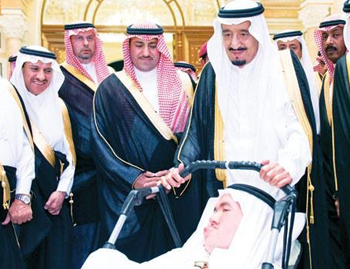Riyadh, Oct 20: Custodian of the Two Holy Mosques King Abdullah has instructed the Ministry of Social Affairs to pay the treatment costs of people with disabilities at rehabilitation centers.
 Prince Sultan bin Salman, chairman of the Board of Trustees of the Prince Salman Center for Disability Research (PSCDR), made the announcement in a media statement on the sidelines of the Fourth International Conference on Disability and Rehabilitation in Riyadh.
Prince Sultan bin Salman, chairman of the Board of Trustees of the Prince Salman Center for Disability Research (PSCDR), made the announcement in a media statement on the sidelines of the Fourth International Conference on Disability and Rehabilitation in Riyadh.
Crown Prince Salman, deputy premier and minister of defense, inaugurated the event on Sunday, which coincided with an award ceremony for the winners of the Prince Salman Award for Disability Research.
The event brought together various prominent personalities and experts both from local and international institutions.
According to organizers, 1,323 participants from 24 countries attended the event, aimed at further enhancing services to the disabled by providing further scientific studies and technological advances in the field.
PSCDR recently announced the names of the winners, which included Fowzan S. Alkuraya, a Saudi professor of human genetics at Alfaisal University’s College of Medicine, in recognition of his distinguished work in the fields of health and medical sciences.
The pedagogical and educational sciences area was awarded to Ann P. Turnbull and Rutherford Turnbull, two US professors who co-founded and co-directed the Beach Center for Disability.
Hugh M. Herr and Prof. Margaret G. Stineman, another two US faculty members, won the award in the rehabilitative and social sciences domain.
“Such awards would encourage scientific research to explore effective solutions to the global issue of disability and investment in science and technology,” he added.
Former Health Minister Dr. Abdullah Al-Rabeeah said the prestigious award was named after the crown prince, thanks to his keen interest in disability issues.
“It seeks to realize their aspirations, as well as encourage the efforts of local, regional and global efforts to enrich science and knowledge in the areas of disability,” added Dr. Al-Rabeeah, the award president.





Comments
Add new comment